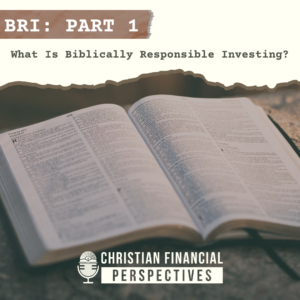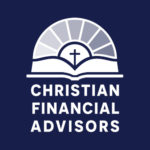Biblically Responsible Investing Part 1
In Part 1 of 3 about Biblically Responsible Investing, Bob and Shawn delve into what exactly Biblically Responsible Investing – BRI – encompasses, how it works, and some of the companies that Christian Financial Advisors works with. What exactly is BRI? Well, Biblically Responsible Investing (BRI) falls under the realm of types of Values Based Investing. BRI is the short term phrase for it, and it is something that is the core of Christian Financial Advisors and our investing methodology.
BRI is a great choice of investing for Christian investors, or even regular investors, who want their financial portfolio, mutual funds, and ETFs involved with companies that are supporting the good and filtering out the bad. Learn about how it got started and what makes it different from other values based investing choices.
HOSTED BY: Bob Barber, CWS®, CKA®
CO-HOST: Shawn Peters
Mentioned In This Episode
Bible Verses In This Episode
PROVERBS 13:11
Dishonest money dwindles away, but he who gathers money little by little makes it grow.
PROVERBS 15:1
The house of the righteous contains great treasure, but the income of the wicked brings trouble.
Want to ask a question about your specific situation? Schedule a complimentary 15 minute phone call.
EPISODE TRANSCRIPT
Intro:
Welcome to Christian Financial Perspectives, where you’re invited to gain insight, wisdom, and knowledge about how Christians integrate their faith, life, and finances with the biblical worldview. Here’s your Christian Financial Advisor’s host, Bob Barber and his co-host, Shawn Peters.
Shawn:
Welcome to another episode of Christian Financial Perspectives. We’re so glad you joined us. If you like this type of content where we talk about financial topics, but from a Christian perspective using biblical principles, please make sure you hit that subscribe button and like this video. Today, we are going to be covering part one of three, of something called Biblically Responsible Investing, or BRI. This is something that is very important to us here at Christian Financial Advisors, and Bob has been around since the ye olden days of this, right Bob?
Bob:
I was young when I started doing this kind of like you are Shawn. Now you’re growing this nice beard I see going on here.
Shawn:
Well, unlike you, Bob…
Bob:
That is some gray in it though. It must be the grandkids doing that to you huh?
Shawn:
Well, my kids You’re your grandkids.
Bob:
Okay.
Shawn:
I have to, Bob. See, I don’t have any wisdom hair in the top of my head. I’ve only got it in my sideburns, so I got to look like I know what I’m talking about and have some wisdom.
Bob:
You can go get some gray color and put it up there. So we are going to talk about Biblically Responsible Investing. This is so important. We’re going to do this over a three-part series, or else you’d be here with us for the next hour. We’re going to cut this down into 12, 15 minute segments, and first, we wanna talk about what the definition of Biblically Responsible Investing is. Shawn’s going to let you know what that is.
Shawn:
Biblically Responsible Investing, or BRI for short, is the type of values-based investing that seeks to align in investor’s holdings with biblical principles. Another term for this could be faith-driven investing or faith-based investing. I know those are two terms that, more and more people are looking for.
Bob:
We’ve called it so many different things over the years. It started off with Morally Responsible Investing. Then it was changed to Biblically Responsible Investing, and you hear it referred to as faith-based investing now.
Shawn:
It’s really all the same though. It comes back to the purpose of what we’re talking about here which is aligning an investor’s holdings with biblical principles as a Christian.
Bob:
Exactly.
Shawn:
Another thing with this is that it’s aligning your investments with companies that support Christian and biblical teachings, principles, while avoiding companies that do not. It’s not just about negative screens. It’s negative and positive screens.
Bob:
In the beginning it was just about negative screens, but now it’s about positive screens as well, which is nice. I’m glad it’s evolved over the last 27 years. I’m one of the founders of the Biblically Responsible Investing movement, so I’ve seen this thing really change a lot.
Shawn:
I know when you first got started, it was you and three or four other people that even talked about it.
Bob:
There was basically five of us. I can still name those names. One of them, has already gone to be with the Lord. He got cancer, but we’re still around. We are very excited about what we have seen with Biblically Responsible Investing, and how it’s grown from this tiny, tiny movement into this gigantic movement now.
Shawn:
A lot of that too, I think is really cool with the way technology has changed over time. I think part of the reason really for it being mostly focused on avoiding these companies that are involved in these specific negative areas is that it was just a little easier to find the information on that. Whereas now with as screening technologies and accessibility to information has improved over time. Now you can look for companies that aren’t involved in certain contentious areas that don’t align with our beliefs as Christians, but you can also look for companies that are involved in doing positive things. It doesn’t all necessarily mean that it’s Christian. It’s just more of a someone is doing something that they’re not doing it because they’re a Christian or because they’re a Christian company, but they just think it’s a good thing to do and we can align with that as a Christian.
Bob:
You can align with, even though you may not be even a Christian, you can align still with biblical principles of morality. That’s what we mean by that.
Shawn:
We have two scriptures. I’m going to cover those.
Bob:
Absolutely. This is a very scripturally based type of investing, so it needs to be in there.
Shawn:
Bob, hopefully, what we can do is have you cover a little bit of the history of why the BRI movement started.
Bob:
I can. I sure can.
Shawn:
Proverbs 13:11, “Dishonest money dwindles away, but he who gathers money little by little makes it grow.” We also have Proverbs 15:1, “The house of the righteous contains great treasure, but the income of the wicked brings the trouble.”
Bob:
Some of the scriptures we always use too, is Psalms 24:1, “The Earth is the Lord’s, and everything in it.” If you believe that God owns it all, then Biblically Responsible Investing is for you. The history started many, many years ago. Like I said, it was about avoidance, and there was a major company back in the nineties that had special days for the LGBT. I remember the Southern Baptist Convention calling for avoiding, supporting that entertainment part. You notice I’m not mentioning names, trying not to. That is what, how this started, and then we started looking at, there’s a lot of companies that were supporting Planned Parenthood. That was like the abortion industry or using fetal tissue research from abortions, or pharmaceuticals. That’s the history and where it’s evolved into today.
Shawn:
Future Shawn here. Just had to add a quick insert for this episode. Just to clarify something that Bob and I are about to talk about in the video. The SEC has decided to use the term ESG as a generic name to categorize all types of Values-Based Investing, which means they consider Biblically Responsible Investing to be a type of ESG. When we reference ESG in the rest of this episode, we are referring to the specific, decades-old type of investing that screens for Environmental, Social, and Governance values, and NOT the generic term the SEC has decided to use in the investment industry to describe different types of Values-Based Investing. And now, back to the video.
Shawn:
Really the concept, I would kind of step back for a second and say Biblically Responsible Investing, faith-based investing, they’re really, and ESG, not saying they’re all the same, but they would all be considered a type of values-based investing. Where you’re not just looking at the financials, but you’re investing based on what a company is or isn’t involved in. Obviously we’re going to get into the differences between this and ESG. Over the last, I’d say really the last 10 years or so, it seems like the idea of investing based on the financials and based on does this company align with you as an investor.
Bob:
As a Christian and my values.
Shawn:
For us as a Christian, it is important because at the end of the day, we will be held accountable to the Lord for how we acted during this life. We know how we handled the things that were given to us to take responsibility of, so that ownership is important.
Bob:
Like you say, BRI or Biblically Responsible Investing, faith-based investing
Shawn:
Is not ESG.
Bob:
Is not ESG. What does ESG mean?
Shawn:
ESG is the, environmental… you put me on the spot. It’s the Environmental, Social, and Governance. Sometimes they get those mixed up.
Bob:
It’s not that, it’s actually as opposite as you can get from that.
Shawn:
For the most part. For the most part. I would say calling what a BRI investor does, ESG, is somewhat insulting. As for many years, the ESG methodology has been mostly kind of the opposite of what Christian investors seek out. BRI screens out companies that are involved in supporting abortion and the LGBT agendas.
Bob:
Also gambling, alcohol, and tobacco. We look at slavery, human slavery, and other countries. Are they using child labor? Those are the screens that we say, if that company’s involved in that, we’re not going to buy that company.
Shawn:
Whereas on the flip side, ESG has typically been associated with, if a company is involved in heavily supporting these different types of lifestyle choices with the abortion and LGBT, that they are even celebrating those. Not to mention they want invest in them. That to me is a big difference between BRI and ESG. Now, Bob, we have to kind of cover the beginning, so what options really were there 27, almost 30 years ago? What options did you have when you first started doing this?
Bob:
One to two, maybe three, or you could do individual stocks.
Shawn:
You had to do your own research too. A lot of your painstaking research.
Bob:
The programming way, way back, was just starting off, and I remember Scott Fehrenbacher, the founder of that. Then Timothy Plan bought this program called the Evaluator. Now you can go online and you can look at the evaluator, and anybody can subscribe to it. Take away individual stocks. There were very, very few choices. Just one or two, or even three was the max if you wanted to buy a mutual fund or ETF, that was biblically responsible.
Shawn:
What about today?
Bob:
Oh my goodness that’s changed. Today, the Timothy Plan mutual funds that were, Art Alley, is the father of Biblically Responsible Investing in this country. Now there’s 12 mutual funds that they offer plus six ETF’s so that’s 18 choices .
Shawn:
Just from that one fund family.
Bob:
Then, Eventide Funds started behind that, and they offer eight different biblically responsible mutual funds. Now you add that together, you’re getting up there in number. Then a few years back, my good friend Robert Nestle, I remember bringing him here to our headquarters and talking to him and educating him about BRI. He found me on online from research. He said, “I want to go see Bob,” and he took the torch and ran with it.
Shawn:
He got a little bit of that itch for like, I really wanna do more with this.
Bob:
I’m so proud of him because he’s the youngest of all of us in the BRI movement. They have eight ETF’s at inspire where he started. When you add just those three investment managers together, there’s 34 different choices now, of biblically responsible ETF’s and mutual funds. 34 choices! I mean, how many choices do you need? Then we put together our portfolios and overweight or underweight these portfolios depending on that.
Shawn:
Keep in mind, that’s just the fun choices. Obviously if you use Inspire, the ETF’s that you were talking about Robert Nestle. Inspire insight is a tool that someone can use actually for free. They do have a paid subscription, but they do have a free one.
Bob:
For monitoring funds and stocks.
Shawn:
If you just wanted to see for some of your own stock picking, if that was something you wanted to do, you do have options now to screen. Whereas 30 years ago, good luck. You’re going to have to go through all that data manually. So that’s really exciting, but keep in mind, one other thing we want to hit highlight is that, do your research. Not all companies that say that they are biblically responsible, that they do BRI are. A couple of examples that, and I’m sorry if somebody gets mad. I’m stepping on some toes here, but Thrivent and Guidestone are not biblically responsible.
Bob:
Not according to our screens.
Shawn:
Not according to our screens and from the information that they’ve shared and posted themselves. One of them that really frustrated me, because we had somebody that came to us and they were evaluating our firm versus some other firms. I did a little research because I hadn’t even heard that Thrivent was even offering faith-based funds.
Bob:
Well, Thrivent came from the Lutheran.
Shawn:
Yes, but here’s what got me. When, you start looking at the disclosures, if you will, the disclaimers of their faith-based funds, it very clearly says that they don’t do any kind of verification. That their funds are actually following the screens that right above that they just said that they’re screening out for. Then on top of that, like with guidestone who fails the screens that we do. Guidestone is one of multiple fund families that they include within their faith-based portfolio. If you’re not doing anything to actually screen or verify, or use companies that pass those screens. How can you call yourself biblically responsible? I mean, otherwise what you’re doing is you’re saying we’re faith-based because we want Christians to invest with us, but you didn’t actually do anything different. That misses the entire point of Biblically Responsible Investing. It should look different than the rest of the world.
Bob:
So that’s going to do it for today. This is just the first part series on Biblically Responsible Investing. We’re going to do a three part series. Next week we’ll get into part two. That’s going to go deeper, and then part three will sum it all up.
Shawn:
That’s right. Thank you for joining us and God bless.
Outro:
We invite you to listen to all of our past episodes, covering many financial topics from a Christian perspective. To make sure you don’t miss any of Bob’s upcoming episodes. You can subscribe to Christian Financial Perspectives on iTunes, Google Podcasts, Spotify, Stitcher, or Amazon Music to learn more about integrating your faith with your finances. Visit Christianfinancialadvisors.com or call (830) 609-6986.
Disclosure:
Investment advisory services offered through Christian Investment Advisors, Inc DBA Christian Financial Advisors also known as Christian Financial Advisors Management Group, a registered investment advisor. Comments from today’s show for informational purposes only, and not to be considered investment advice or recommendations to buy or sell any company that may have been mentioned or discussed. The opinions expressed are solely those of the host Bob Barber and his guests. Bob does not provide tax advice and encourages you to seek guidance from a tax professional. While Christian Investment Advisors believes the information to be accurate and reliable, we do not claim or have responsibility for its completeness, accuracy, or reliability.








